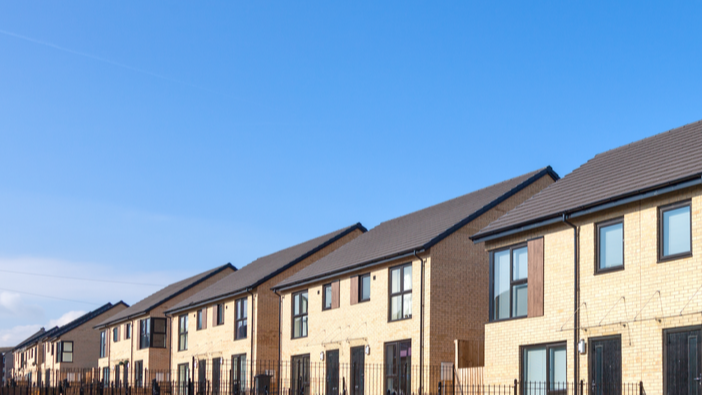By using our site, you agree to our cookie policy.
Is now a good time to buy a house?
Whether you’re a first time buyer or an experienced mover, it’s hard to work out whether now is the right time to buy. Let's go through the pros and cons of buying right now, so you’re armed with all the information to make best decision for you.

Should I buy a house now?
So, you’re wondering whether now is a good time to buy a house? With a constant stream of information about the economy and housing market everywhere you look, it’s hard to know what’s really going on.
Here at Strike we like to tackle big questions, to give you bite-sized and manageable answers. And whether you’re a first time buyer, thinking of turning your hand to buying properties as an investment, or wondering whether to move house for the umpteenth time, “Should I buy a house now?” is a very big question! Of course, it depends on your specific situation, but by the end of this guide, you should understand the pros and cons of buying a house right now, and whether it feels right for you.
Firstly — what’s going on with house prices?
If you’re thinking about buying a house, you’re going to be thinking about house prices. Yes there are a lot of other financial implications (which we’ll get onto), but first let’s take a look at the price of property in 2023. It can be hard to tell what’s going on with house prices because there are so many figures, and they’re all seem to be saying different things. Why? Because the stats are measuring slightly different changes — so whilst one house selling website might be reporting on asking price, a bank or lender will be using data from mortgages they have approved. Some may be looking at the differences from year to year, some might be looking month to month. So it creates a lot of noise. Many predicted a huge property crash following on from the mini-budget in 2022, but current figures indicate a lot less drama than all that. House prices are falling, but not as drastically as once the forecast suggested at the end of 2022. Most people are referring to this drop in house prices as a “correction” of the high house price rises seen in 2021.

Great, but why were house prices high in 2021? Lots of pent up demand after the housing market was frozen at the start of the pandemic Availability of low mortgage rates The stamp duty holiday, which ended in October 2021 After a boom like this, many feared we’d see a bust. But most experts are reporting that we’ve successfully swerved this — a testament to the enduring strength of the UK housing market? At least, for now.
So how big is this house price drop or “correction” currently?
Part of knowing whether it’s the right time to sell a house is knowing what’s actually going with house prices in the UK.
Lots of stats show that house prices are falling. Property selling website Zoopla is reporting that sellers are currently taking £14,000 off their original asking prices on average, which is the biggest discount in 5 years. Nationwide is suggesting that house prices are still falling. But remember, this is still being described by experts as a correction rather than a major crash. Also, other figures show some positive growth. Halifax suggests that there has been a small rise in house prices (1.1%) between January and February, whilst the Office for National Statistics recorded a 6.3% jump in house prices between January 2022 and 2023.
And what does the future hold for house prices?
So — moving up, down, sideways — what’s actually happening in the UK housing market in 2023? And is it a good time to buy a house in the uk? Well, the Office for Budget Responsibility (OBR) predicts that house prices will fall 9% over the next two years before rising again in 2025. So one thing to bear in mind is that whilst buying could be a great option right now whilst house prices are low, you may want to avoid buying now if you’re thinking of selling in less than 2-3 years. In other words, while 2023 might be the time to buy a long-term home whilst prices are low, it’s perhaps not the right time for a short-term investment. And these are just predictions — so you need to think about what’s best for you. One danger when buying a house if house prices are at a low (and may continue to drop) is the risk of being in negative equity. Negative equity is when the value of your home is worth less than the amount you have still to pay on your mortgage. For example if you bought a house for £300,000 and put down a £15,000 deposit, the bank will be lending you £285,000. If the value of your property drops by 10% to £270,000, then you would owe the bank more than the value of your property. This is negative equity.

Though it sounds scary, it’s not a common problem, and even if it occurs then it’s only an issue if: You want to remortgage with a new mortgage lender If you want to sell your home quickly after buying it If you get behind on your mortgage repayments and it’s repossessed and sold by your lender. Then you’ll still be in debt to your lender even after the property is sold. So, yes negative equity is scary, and the current climate means it’s not totally out of the question. But if you’re planning on buying a property with no hopes to resell in the near future, buying when the price is low could be a really positive thing - why not capitalise on the low price point of property?
What’s causing house prices to fall?
Why are house prices dropping? Low demand on the market because the cost of living crisis means people can’t save enough to buy. High supply as lots of people are selling up because of rising prices, particularly of energy bills. It’s harder to find cheap mortgage deals. It’s more expensive to borrow money because of high interest rates. Speaking of mortgages… what’s going on with them? And how will that affect whether I should buy a house right now?

What about mortgage rates?
Another factor you need to consider when deciding whether to buy a house now, is what’s going on in the world of mortgages? Do lenders have good rates readily available? And how affordable is it to borrow money in 2023?

The end of 2022 saw lenders removing their most affordable rates from the market, but this is now improving with cheaper mortgage deals returning. This is particularly good news for first time buyers who are looking for more affordable deals as they are less likely to have chunky deposits. Also, according to Bank of England approvals for mortgages are on the up, meaning more people are able to buy houses with mortgages. But as we’ve seen, mortgage rates can change quickly — so always make sure you’re checking the most up to date rates and talk to a broker if you’re not sure.
And the cost of borrowing?
For a lot of us, buying a home in the UK means borrowing a lot of money. So what do mortgages look like in 2023?
It is currently expensive to borrow money, with experts predicting that this won’t be getting better anytime soon. Why is it so expensive? Because of the steady rise of interest rates.
The Bank of England is increasing interest rates in a bid to reduce inflation, but the byproduct of this means it’s very expensive to borrow money. Rising rates makes it more expensive to borrow money from lenders, which means fewer people are able to afford mortgages. So, while you might save money on the price of your property, rising mortgage costs could potentially cancel out these savings because of the chunky cost of borrowing. This is particularly problematic when thinking about remortgaging when your current deal ends, or if you’re on a variable mortgage rate, as you have no way to control or predict the rising price of borrowing money. This is a big “pro” for buying now and securing a 5 year fixed rate mortgage; even if house prices come down a bit during that period, you’re protected against rising interest rates because you’ve fixed the cost of borrowing earlier.

So, should you buy a house right now? Some takeaways...
House prices are low - this is particularly appealing for first time buyers who want to maximise their budgets. House prices may continue to drop, so some people are considering waiting and pouncing when prices hit what seems like rock bottom. Yes, house prices are low, but it’s expensive to borrow money. And the Bank of England’s base rate is expected to peak at 4.75% in 2023, meaning borrowing money will become more expensive this year. So when you’re thinking about buying a house right now, you’re calculating: the cost of buying a property (cheap) versus the cost of borrowing (expensive) – it’s a delicate art but we know you can do it. Still have some questions? Reach out! Or check out our mortgage advice for a more detailed rundown of borrowing money right now.
Strike feel free
Copyright © Strike Limited 2024

